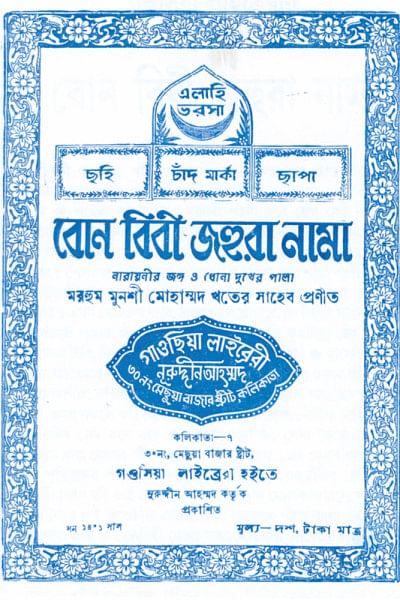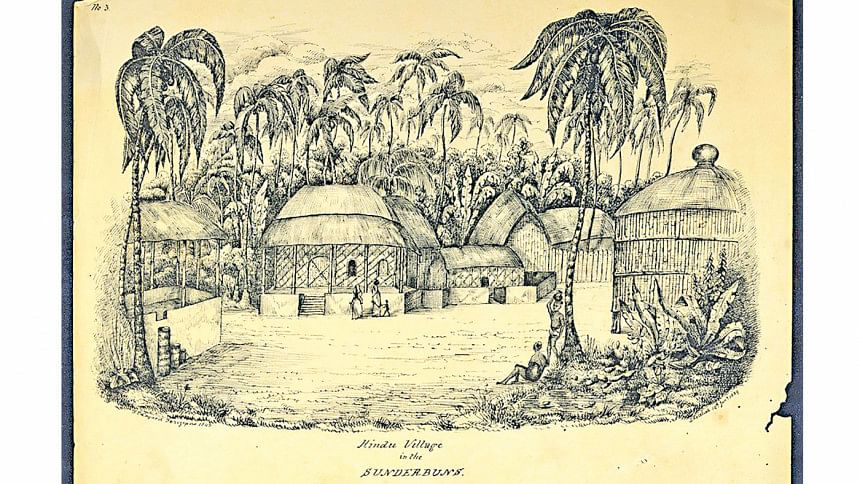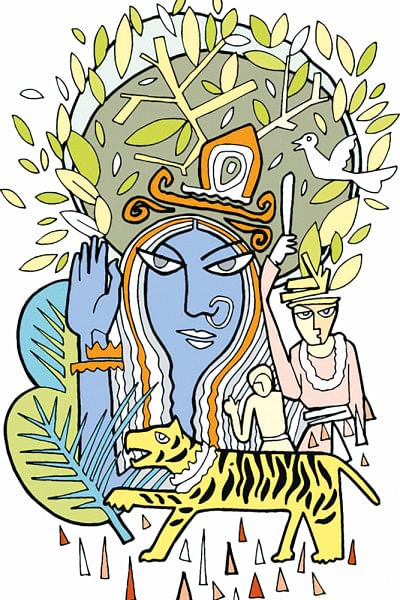The Sundarbans is the world's largest mangrove forest and locals generally identify the area as "Badabon" or "Athero Bhatir Desh" (land of the eighteen tides).
An estimated twelve million people live in and around the Sundarbans, most of whom are economically and socially marginalised and mainly depend on the forest's resources. The majority of them are poor Muslims and Namasudra, or scheduled caste Hindus who have been venturing into the forest for a long time. By profession they are mainly fishers, woodcutters, honey and wax collectors, and homestead farmers.
The forest dwellers use a Bengali proverb in everyday life called "Jole Kumir Dangaye Bagh" (crocodile in the water and tiger on the land), which unravels the dangerous milieu of their life. In that swampy mangrove forest, the water is full of crocodiles and the land is full of tigers; hence the region is highly risky, especially for those who venture there in order to collect food and resources. Therefore, surviving in that landscape is an urgent matter of concern since every year, many people are devoured by tigers and crocodiles.
In these circumstances, they found Bonbibi, a mythical figure who has the magical power to protect life in the Sundarbans if one has faith in her and devotionally worships her, reciting her name ritually.
There remains a lack of clarity about when, historically, Bonbibi came to exist in the Sundarbans. Some folklorists are of the opinion that Bonbibi gained popularity in the mangrove forest with the emergence of Islam in the area in the early 15th century. Others argue that she was a Hindu goddess who was turned into a Muslim-sufi figure over time.
The antiquities of Bonbibi can be traced in documents where the "Hindu Zamindar from mediaeval times mentions the existence of Bonbibi's Thaan (temple) in their documents" (S. K. Mandal. Banbibir Pala. Kolkata: Gangchil Publisher, 2016, Pg. 41).
Another travelogue deserves mention in this regard. A European traveller François Bernier travelled to the Sundarbans in 1665-66 and accounted for the tiger cult he found, as "it constantly happens that some person or another falls prey to tigers", (Francois Bernier. Travels in the Mogul Empire A. D. 1656–1668. New York: Oxford University Press, 1914, pg. 443).
Apart from that, Krisnaram Das composed "Ray Mangal Kavya" (poetry of the auspiciousness of Dakshin Ray) in 1684, which was mostly dedicated to depicting the acts and glory of the deity of the tiger cult, Dakshin Ray, who is one of the most significant figures in Bonbibi's story. Those accounts abruptly glimpse the antiquities of Bonbibi.
In the late 19th century, William Wilson Hunter and other gazetteers of Khulna , Jashore, and 24 Parganas interchangeably used the name of Bonbibi as "sylvan deity", "spirit" and "forest deities", and "supernatural personage", and narrated how the tiger charmer/fakir/boulee venerates her.
The early 20th century Bengal district gazetteer (Khulna) recorded that both Muslims and Hindus worship her.
O'Malley gave brief accounts of how devotees venerated her, writing "both Hindus and Muhammadans, of professional woodcutters named banlis, proceed in boats to certain localities in the forest called gais, each of which is presided over by a fakir who is supposed to possess the occult power of charming away tigers and has some knowledge of woodcrafts."
"Here the wood-cutters work six days each week but the remaining day (but no day in particular) is set apart for the worship of the sylvan deity presiding over that particular forest." (L.S.S O'Malley. Bengal District Gazetteers: Khulna. Calcutta: The Bengal Secretariat Book Depot, 1908, pg.193-94).
Prior to that, Hunter stated that, "each woodcutter, before commencing work, makes an offering to the jungle deities, by which act he is supposed to have gained a right to their protection." (W. W. Hunter. A statistical account of Bengal. Vol. 1. Districts of the 24 Parganas and Sundarbans. London: Trubner & Co., 1875, pg. 312).
The early printed version of Bonbibi Johuranama: Narayani Jongo o Dhona Dukheyer Pala (the narratives of Bonbibi's Glory: War of Narayani and tale of Dhona-Dukhey) came out when Munshi Muhammad Khater wrote an auto-telic chapbook in the late 19th century on request of Sundarbans inhabitants, who used to visit Kolkata to buy Puthi literature.
Abdur Rahim Sahib authored another book on Bonbibi. Several other printed puthis on Bonbibi came out over time. Still though, the Bonbibi Johuranama by Khater remains the most popular.
Bonbibi Johuranama is composed in a Bengali verse metre known as "dwipodi-poyar", or the "two-footed line" and the metre consists of rhyming couplets.

The vocabulary of Bonbibi Johuranama is a confluence of Persian, Arabic, Urdu, Deshi and demotic distinctive to standard Bengali, and the chapbook pages opened to the right like Arabic. (Mandal 2016: 33)
The first episode of Bonbibi Johuranama illustrates the cosmogony of Bonbibi, how she was born and abandoned in the forest, brought up by wildlife and fairies and descended to the Sundarbans with a divine charge bestowed by Allah, and how she established her sovereign power in the forest through warfare against Narayani (mother of the tiger demon Dakshin Ray).
The second episode is Dukhey's tale of how Bonbibi rescued him from the tiger demon and helped him to get back to his village with a gift of immense wealth. According to Bonbibi Johuranama, there was a couple in Mecca and their names were Berahim (Ibrahim) Fakir (Sufi) and Phulbibi. Phulbibi was unable to conceive for a long time and was destined to be barren. Once she suggested Berahim to visit the prophet's tomb to pray for children.
So, Berahim went on a pilgrimage and prayed at the prophet's grave, and asked for his appeal to be brought to Allah as well as to the Prophet's daughter, the keeper of paradise Fatima, and the eternal Quran. The Prophet then replied to Berahim: Fatima said you would get two children if you had a second wife.
Berahim returned to Phulbibi who became terrified after hearing this news. However, she eventually agreed to let Berahim get a second wife on the condition that whatever she would ask for in the future must be fulfilled.
So, Berahim got a second wife based upon the pledge and some years later, his second wife, Golalbibi, became pregnant. Outraged and full of jealousy, Phulbibi reminded Berahim of his pledge and pursuing that promise, she asked him to send Golalbibi into exile in the forest. Following the conditions of their marriage, Berahim had to leave his pregnant wife alone deep in the forest when she was about to give birth.
At that moment, Golalbibi's cries of distress in prayer gained sympathy from Allah and from heaven. Allah sent four Hurs (fairies) to guide Golalbibi through her unbearable labor pain. With assistance from the Hurs, Golalbibi was able to give birth to twins, namely Bonbibi and Shah Jongli.

As she was with two newborn babies in a desolate place, she was helpless and unable to raise both children together. So, she left Bonbibi in the forest and came back carrying Shah Jongli.
In these circumstances, deers of the forest and Hurs came forward to cherish aid, take care, and raise the little Bonbibi with the doe breastfeeding her like a mother.
This is how Bonbibi grew up with wildlife. Somehow, seven years later, Bonbibi and Shah Jongli met each other when they went to Mecca-Medina to perform ziyarat (pilgrimage) to the Prophet and Fatima's tomb.
Having been blessed by Fatima and getting Khilafat from the Prophet, they became Murids (disciples) of Hasan's son, the second Shia Imam.
During the pilgrimage, through a oracle, they got the divine charge to protect the lives in Athero Bhatir Desh, wherein Dakshin Ray had become a man-eating tiger.
When they arrived at the land of eighteen tides, they issued a call to prayer (Adhan). As the Adhan rolled out across the swamp forest, Dakshin Ray was infuriated because of their intrusive arrival.
Dakshin Ray attempted to resist them and root them out on the question of the sovereign authority of the swamp forest. Seeing as Bonbibi was a woman, Dakshin Ray's mother Narayani decided that she would partake in the warfare in place of her son.
The fanfare of war spread around the swamp forest. During the warfare, both Bonbibi and Narayani held the magical power to defeat each other.
But by the end of the war, Narayani called Bonbibi a Shai (friend). As a sign of that fraternity, Bonbibi deployed them to rule a particular section of Atharo Bhatir Desh called Kedokhali, and Bonbibi became the supreme authority of the Sundarbans.
Finally, all of them promised to ensure peaceful lives in the Sundarbans.
The third episode of Bonbibi Johuranama narrates the sorrowful story of Dukhey.
Dhona is a wealthy businessman who trades in the valuable honey and wax of the Sundarbans. On the other hand, Dukhey comes from a poor family and lives with his mother in great deprivation since he has no job skills other than herding cattle.
Dhona once attempted to sail seven boats into the Sundarbans to collect honey and wax but could not gather enough crew. Then, Dhona tried to lure Dukhey by saying if he joined the venture, he would learn a new trade and earn a handsome amount of wealth. Dhona also promised to arrange a lavish wedding for Dukhey after coming back.
Dukhey agreed to sail into the swamp with Dhona as he wanted to change his fate but his mother countered the lucrative offer, saying that Dukhey was her utmost reason to live on earth, and that she did not want enormous wealth but only Dukhey. She did not want Dukhey to work in a dangerous forest.
Dhona pledged to take care of Dukhey as his own son, and Dukhey's mother was convinced although she remained in a fastidious state of mind.
She was afraid of the dangers of the Sundarbans, a place full of strange spirits, demons, and man-eating tigers like Dakshin Ray. In any given circumstance if he fell in danger, Dukhey was advised to devotionally call out Bonbibi's name, and Bonbibi, being the mother of kindness and protector of the forest, would come forward to save him.

Dhona then sailed the seven boats into the Sundarbans, entering the deep-dense forest, crossing multiple rivers and creeks as he rampantly looked for honeycombs, but only found a barren forest.
Even when a few honeycombs were found, there was no honey left in them. It was a trick played by Dakshin Ray to lure and deceive Dhona .
Why? Because Dhona had neglected to offer Puja to Dakshin Ray, and thus had intrusively entered his territory.
As a result, the shape-shifter of the forest, Dakshin Ray concealed all of the honey and wax with his magical power as the resources of the forest exclusively belonged to him.
Dhona was thus in an uncanny atmosphere, perplexed by this trick. In such a tumultuous situation, Dakshin Ray entered Dhona's dream and declared that if he wanted to take something, he must give something in return.
To be precise, Dakshin Ray demanded a narabali or human sacrifice, as he had not tasted human flesh for a long time as no human hunts came his way.
In exchange for the human sacrifice, he offered Dhona seven boats full of honey and wax. Initially, Dhona did not agree with the evil proposal and wanted to return but Dakshin Ray threatened to sink his entire fleet, and leave all his people as food for crocodiles.
At one point of discussion, Dhona offered himself for the Naraboli so as to save the others, but Dakshin Ray refused to accept as he only wanted the innocent and tender Dukhey. On those words, Dhona sank into despair.
Ultimately, in desperation, Dhona made a trap and left Dukhey alone deep in the forest as a human sacrifice. In return for the narabali, Dhona got his promised honey and wax while Dukhey was left in dense sylvan greenery to be devoured by the tiger.
At that moment, Dukhey's helpless, perplexed mind crashed into darkness but out of nowhere, his mother's words suddenly rang in his head: if you fall in any danger, seek protection from Ma Bonbibi by calling out her name in devotion.
Following that instruction, Dukhey started reciting: "Save me, Ma BonBibi before I'm torn apart; an unearthly tiger wants to rip out my heart. It's not a mere animal, it's a demonic being; no earthly creature could be so conniving. Come, I beseech you, take pity on Dukhey, don't let this prayer be the last I ever say". (Amitav Ghosh. Jungle nama: A story of the sundarban. India Harper Collins Publisher, 2021, pg.53)
Bonbibi responded to Dukhey's call and protected him from the greedy grasp of Dakshin Ray. The failed attempts of Dakshin Ray to devour Dukhey unravelled a new conflict between Bonbibi and the demon.
Bonbibi wanted to teach Dakshin Ray a lesson so she sent Shah Jongli to drag him out, but Dakshin Ray secured shelter with his old friend Borkhan Gaji, who had the virtues of taming animals and travelling in the forest on a tiger.
In that juncture of conflict, Borkhan Gaji came to act as a mediator. He held back Dakshin Ray and placed a peace treaty before Bonbibi, saying that she first arrived in the tidelands over a fight against Narayani, but ultimately recognised her as a friend.
Who can be dismissive of their friend's son? After much pleading, Dakshin Ray was at last pardoned on a pledge; no more human hunts. In that reconciliation, both Dakshin Ray and Borkhan Gaji gifted immense wealth to the wretched Dukhey. Bonbibi also ordered a crocodile to take him back to the village.
Every year, usually on the first of Magh, an annual festival takes place in and around the forest. On the festival day, Bonojibis (forest dwellers) make temporary thaans (temple) inside the forest and riverbank. The temporary thaans of Bonbibi look like tiny huts made of leaves and wood on a rectangular base of solid mud.
On the celebration date, devotees install clay-made images of Bonbibi, Shah Jongli, Dakshin Roy, Dukhey, and Borkhan Gaji in the thaans.
Bonbibi usually bears a yellowish look, has a crown on her head, and wildflower necklace on her neck. Everywhere on the body, devotees install various decorative ornaments. Borkhan Gaji is found wearing a cap, Panjabi, Lungi, and shoes.
Every devotee sits down in the courtyard of thaans, and people read the entire texts of Bonbibi Johuranama by rotation. After worship and veneration, the devotees distribute traditional sweets, fruits, Muri, Kitchuri, and other foods to attendees and visitors.
People still remember the magnificent glory of Bonbibi in the Sundarbans and for those devotees Bonbibi stated that: "Whenever anyone in this forest calls me mother, I must fly to their rescue. You do not understand the responsibility and implications of wielding the power of barakat. In the low-lying lands of the eighteen tides, I am the mother of each and everyone." (Tony K. Stewart 2019: 110)
Bonbibi saved Dukhey from the clutches of the tiger as she is the mother and protector of the forest. Taking into account Dukhey's tale, the bonojibis of Sundarbans still believe that if they fall in any danger in the forest, Bonbibi will come to save them if they have innocent hearts like Dukhey.
As a result, people who dwell and venture into the forest devoutly follow the rituals and venerate Bonbibi in order to secure physical safety in the dangerous landscape.
Nevertheless, from the stories of the first episode, the devotees also embodied the idea that since she was born and brought up in the forest, she knows the secrets of the forest, and she knows better how the forest acts and functions in every operation. Therefore, she is able to protect the bonojibis. Through these stories, the forest dwellers in the Sundarbans embodied the belief of Bonbibi.
Md Raihan Raju is a PhD researcher at the Department of Sociology, South Asian University, New Delhi. He can be contracted at [email protected]


Comments